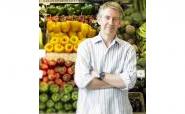Advertisement
Featured article
Top 10 secrets of 100% healthy people
A review of Patrick Holford's book of health tips

This is the latest book from Patrick Holford, but where does he source his data? If any of you have visited Holford's website, you may have seen an invitation to fill in an on-line questionnaire about your health. Always a curious person, I did my first one about 12 years ago, scoring a disappointing average (I thought I was super healthy!). Since its inception in the 1990s, this health questionnaire has been completed by over 55,000 people, which makes it probably the largest health study ever done.
Among the respondents, 6% came out in optimum health, 50% in moderate health and 44% in poor to very poor health. Holford did further studies into those 6% at the top, how they lived their lives and what they held important, and divided the results into these 10 secrets.
He believes that the person in average health has stress, gets impatient, tired, has sleep problems, digestive issues, poor immunity, PMS or menopausal symptoms and other common health issues. He recommends that you follow his steps to 100% health so you can free yourself from these symptoms and issues. He goes even further to say that you can protect yourself from even more serious problems such as cancer, Alzheimer's, diabetes and heart disease! It is an assumption that if your parents suffer from one of these diseases, you yourself will fall prey because it's in your genes. Holford says that is NOT THE CASE. Only 1 in 100 people are genetically pre-disposed to get Alzheimer's, the rest of it is down to how you choose to live your life.
article continuedAdvertisement
He takes the example of cancer. In the UK, a woman's chance of developing breast cancer is 1 in 9, the same goes for prostate cancer in men. In China however, the chance of getting breast cancer is 1 in 5000, prostate cancer 1 in 59,000! But this is not a case of lucky Chinese genes because when a Chinese person adopts a Western lifestyle, particularly the diet, their risk of getting those diseases increases.
The one question that persists throughout the book is: what is it that the 100% healthy people do that other people don't? In most health books I've read, the underlying theme is always: what should we avoid eating to lessen our chances of becoming ill. But this is not a run-of-the-mill health book. In Part 1, there are details of what the healthiest people eat and drink and what they avoid eating and drinking. Unsurprisingly, the vast majority of these top scorers also took supplements to their diet and took regular exercise.
You are encouraged to take short health questionnaires which are presented in each chapter in Part 1, then in Part 2, you are told how to interpret your results and how to make improvements if you choose to do so. This section is broken down simply into:
- blood sugar balance: why you get energy slumps, feel fatigued, crave caffeine
- how to identify foods you are intolerant to
- foods that add years to your life and foods that do the opposite
- why you need essential fats
- the importance of hydration
- advice on fitness
One term which is not too familiar in this country but which Holford is enthusiastic about is Homocysteine. This is a broad, extensive term to indicate how your body transforms food into energy, how the processes that manage your brain and body work in balance with each other. Your Homocysteine or H score is an indicant of how long you will live.
If you score low on any of the questionnaires, this book serves up advice on how to raise that score. Holford gives an example with migraines, a common affliction. Based on studies, he says that giving migraine sufferers B vitamins B6, B12, folic acid and B2 can halve the incidents of migraines.
A topic which is significant in this book and which Holford devotes whole chapters to is not food, drink or illness related. He found that of those 6% top scorers in optimum health, all had good emotional health. The majority maintained good to excellent relationships. They realized the importance of living for the present and the future and had learnt to discard their emotional baggage. Most had a spiritual awareness and positive outlook or, as Holford puts it, your sense of self. While I have been exposed to studies on the subject of how repressed emotions and repressed energy will lead to tension in the body and eventually disease, it is refreshing and positive to see this subject dealt with so extensively and as part of a mainstream health book.
We all have a choice on how we live our lives, whether it's conditioned from childhood or we make a conscious decision to go one way or another. This book is not about advocating a particular diet, just advice on how to improve your chances of living in optimum health. You can decide to raise your score, or not. It's your choice.
Got something to say?
We are looking for authors! Submit an article.
Related articles
Cosmeceuticals - where cosmetics and pharmaceuticals meet
What they are and what you need to know
Review: Dancing with the Stars - Cardio Dance
An aerobic alternative with the stars from TV
Cholesterol and diet
The different types of cholesterol, and how to reduce the bad kinds in your diet
Top Stories
Flat iron tips for a great hairstyle
Get the Taylor Swift look in three simple steps
Newest trends in facelifts
Facelifts are getting cheaper and quicker
Hair dyes - choosing the right hair color for you
Get the right shade and product for the effect you want
Comments
Add your comment